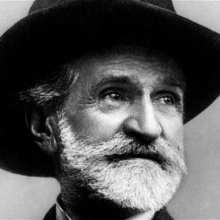 Giuseppe Fortunino Francesco Verdi (the middle two names are bracketed in New Groves and thus optional: they are, in fact, never used) rates over 16 pages of article in the New Groves, where most composers get a paragraph or three: he is a very significant composer, mostly of operas. Much of his output has remained in the daily repertoire of opera houses round the globe, in a way that's really only true otherwise of, maybe, Mozart and Wagner. He was a superb tune-smith, able to churn out with apparent ease memorable melodies that can stir emotions whilst simultaneously conveying a character's motivations. His orchestrations are also subtle and skillful. He liked to present himself as a bit of a rural oaf, ill-educated and mostly self-taught in music, but that was him merely trying to construct a narrative: he actually had a good musical education and was strongly encouraged in his musical ambitions by his land-owning, tavern-running parents. He was learning Latin at age 4, for example: not exactly what peasants usually get up to, I think!
Giuseppe Fortunino Francesco Verdi (the middle two names are bracketed in New Groves and thus optional: they are, in fact, never used) rates over 16 pages of article in the New Groves, where most composers get a paragraph or three: he is a very significant composer, mostly of operas. Much of his output has remained in the daily repertoire of opera houses round the globe, in a way that's really only true otherwise of, maybe, Mozart and Wagner. He was a superb tune-smith, able to churn out with apparent ease memorable melodies that can stir emotions whilst simultaneously conveying a character's motivations. His orchestrations are also subtle and skillful. He liked to present himself as a bit of a rural oaf, ill-educated and mostly self-taught in music, but that was him merely trying to construct a narrative: he actually had a good musical education and was strongly encouraged in his musical ambitions by his land-owning, tavern-running parents. He was learning Latin at age 4, for example: not exactly what peasants usually get up to, I think!
He was born in the tiny village of Le Roncole, south-east of Milan, due east of Turin, in northern Italy in October 1813. He celebrated his birthday as October 9th, but there is scope for confusion on the point, and he may have been born on the 10th. He was to die at the Grand Hotel, Milan some 88 years later, on January 27th 1901: he is buried in the same city.
All told, Verdi wrote (or revised) some 37 operas, a monumental output by anyone's standards. Some of the all-time greats amongst them must, surely, include: Nabucco, Macbeth, Rigoletto, La Traviata, Il Trovatore, Don Carlos, Simon Boccanegra, Un Ballo in Maschera, Aida, Otello and Falstaff. He additionally wrote the revered Requiem and Quattro pezzi sacri -the last being the four last compositions he ever completed.
Sadly, his musical reputation was somewhat eclipsed before he died because of one Richard Wagner, Verdi's contempory (also born in 1813): the critic Ernest Newman wrote in 1933 that Verdi repeated 'the same wretched formulae from one work to another and was incapable of growth in the understanding of human nature'. Compared to Wagner's operas, Verdi's were seen around that time as formulaic and superficial, without any of the intellectual or musical 'heft' of Wagner's offerings. Since the end of World War II, however, all his works have been revived and whilst he may not be thought to be the most musicologically sound of composers, no-one seriously questions his musico-theatrical skill. He is as different from Wagner as coffee is from tea -but the general consensus these days is that just as there's scope for a kitchen to prepare both tea and coffee, the musical world is big enough to be able to comfortably contain both Wagner and Verdi. They appeal to different people (or the same people at different times): it's just a matter of taste, not fundamental musical worth.
Music Plays from my collection
(since January 9th 2021)
| Date of Play | Time of Play | Genre | Composition | Length | Play Count |
|---|---|---|---|---|---|
| Date of Play | Time of Play | Genre | Composition | Length | Play Count |